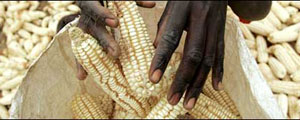
DIRECT imports of maize and wheat since 1999 have cost the country $3,3 billion due to shortfalls in domestic production, Bankers’ Association of Zimbabwe president Sam Malaba said yesterday.
TARISAI MANDIZHA BUSINESS REPORTER
Speaking at the second edition of the agro-business conference held on the sidelines of the 2014 Harare Agricultural Show, Malaba said the increase in imports had contributed to the widening of the current account deficit to $4 billion last year from $3,6 billion in 2012.
“Illustrative of the current challenges, Zimbabwe has been importing food due to shortfalls. Direct food imports in terms of maize and wheat average $550 million per year implying a cumulative total amount of $3,3 billion since 2009, as per Reserve Bank of Zimbabwe balance of payments statistics,” Malaba said.
Malaba said the decline in agriculture production had, in tandem, “occasioned corresponding decline in related manufacturing sub-sectors leading to low industrial capacity utilisation”.
He said over 70% of the population derives their livelihood from agriculture and, therefore, measures to address poverty alleviation must in some way target the agricultural sector.
He, however, said since dollarisation in 2009, the banking system had been characterised by short-term deposits, with 80% of the deposits being demand deposits which are not readily available for medium or long-term financing.
Malaba added: “Agriculture only received 15,68% of total loans and advances from the banking sector; about $600 million as at the end of June 2014. The challenge of agricultural financing in Zimbabwe must be viewed in the context of the broader economic situation prevailing in the country characterised by serious liquidity constraints, declining economic activity, low domestic demand and a widening current account deficit.”











